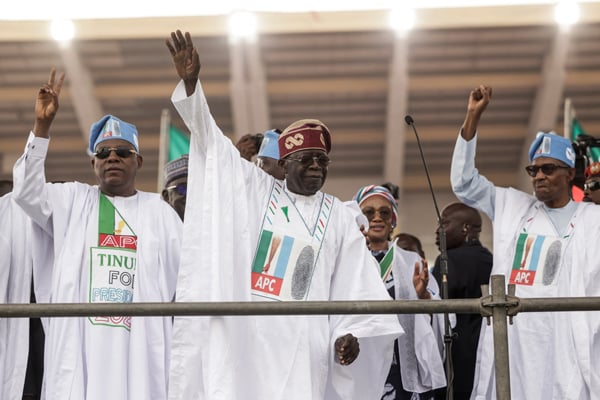The impossible African voter

All Progressive Congress (APC) leader and President-elect Bola Tinubu (centre) and President of Nigeria Muhammadu Buhari gesture towards the crowd during the APC party campaign rally at Teslim Balogun Stadium in Lagos on February 21, 2023.
It is an all-too-familiar African election story. Three Nigerian opposition parties on Tuesday announced they are boycotting the process to collate votes from Saturday’s election, alleging “monumental disparities” between the official results and data available with their parties’ polling agents.
The ruling People’s Democratic Party (PDP), Labour Party and the smaller African Democratic Congress called for the cancellation of the poll and a new vote. It didn’t happen unless a court nullifies the outcome.
There are many similarities there with the events that unfolded after Kenya’s election last August. President-elect Bola Tinubu is likely to find himself in the unusual situation President William Ruto is in.
Traditionally, voters give a newly elected government about a year to find its footing before they begin giving it heartache. But the Kenyan public seems to have dramatically shortened the honeymoon period and, just five months in office, they are on the streets protesting the high cost of living, taxes and other economic grievances.
The popular commentary goes that voters feel betrayed by the Ruto government as he had broken his campaign promise to reduce the cost of living. It is a simple and catchy argument, but is it true?
The signs that Kenya would see restlessness were apparent before Dr Ruto became president. They were in the 2023 low voter turnout. The turnout in the election became a political football in the dispute over the election outcome, see-sawing from about 51 per cent to 56.17 per cent, where the Independent Electoral and Boundaries Commission (IEBC) eventually pegged it. Whatever the percentage, it was the lowest turnout in 15 years.
In Nigeria’s case, most accounts so far suggest that it will be far lower than Kenya. Figures of 40 per cent were being thrown around, and those were on the higher side. Some reports put the actual turnout at 19 per cent and in some federal states with five million registered voters, only one million turned out to cast their ballots.
Low turnout
Anyhow, low turnout might be the primary reason Ruto’s honeymoon has been cut short. It means too many people (the majority) are outside the political conversation over the manifestos of presidential candidates and their parties’ and, therefore, not part of the pact they make with the voters. They can’t be told to be patient because they were not part of the political bargain struck during the campaigns.
This begs the question of why, increasingly, the majority don’t turn out to vote in countries like Kenya and Nigeria. The accepted wisdom is that their vote doesn’t make a difference. The new leaders, like the old ones, will break their promises, be corrupt, lie and cheat until the next election.
More thoughtful studies, however, suggest there are more forces at play. Ten years ago, a fascinating working paper published by the African Development Bank (AfDB), “Remittances and the Voter Turnout in Sub-Saharan Africa: Evidence from Macro and Micro Level Data”, by Christian Ebeke and Thierry Yogo found that high diaspora remittances are likely to lead to lower voter turnout. Nigeria and Kenya are some of the highest diaspora remittance recipients in Africa, so there you have it.
Although the paper didn’t say it this bluntly, diaspora remittances have become such a main source of sustenance they matter more for many Africans than what the government can put on the table.
Some contrarian commentators even remarked, in the case of Zimbabwe during Robert Mugabe’s rule, that some self-serving voters wanted an incompetent government at home, which forced their educated relatives to flee abroad, where they earn more money than if they stayed, and therefore send them a larger cut.
If your daughter is a school teacher who gives you Sh2,500 ($20) a month from her meagre salary, you are definitely several times better off when she takes off to Dubai and gets a job as a waitress and then sends you Sh10,000 ($80) a month.
In theory, in that situation, you have a greater incentive to withhold your vote and deny the next president the legitimacy to carry forward a bold economic agenda, and the election of a bad government would serve your selfish interests best. It’s doubtful, though, that real-life voters are that calculating and cynical.
In a different take on African voter behaviour, Halfdan Lynge and Ferran Martínez Coma, of Griffith University, Australia, in a 2022 study, “The effect of economic downturns on voter turnout in Africa”, reported that gross domestic product (GDP) per capita growth had had a positive impact on voter turnout. “When the economy booms, African voters are more likely to go to the polls. When it busts, they are more likely to stay at home”, they said.
The Nigerian economy is in a bad place. Kenya was already walking on banana peelings by election time last year. The African voter is as devious as they are clever.
Mr Onyango-Obbo is a journalist, writer, and curator of the “Wall of Great Africans”. @cobbo3





